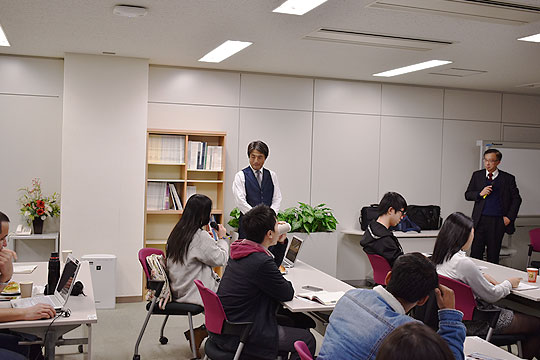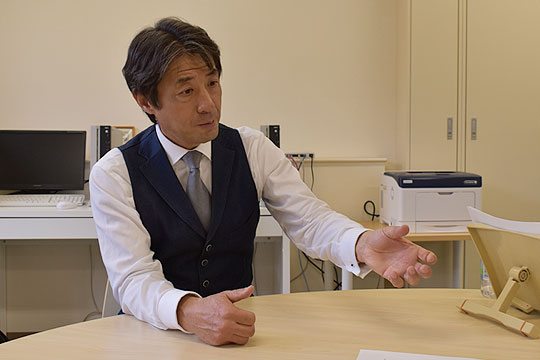Hiroshi Etani, representative director and president of CMA CGM Japan, gave an RCAPS Onigiri Seminar last month entitled “Trend of Supply Chain Logistics – Today and Future.” Etani sat for an interview to give more details about the topic and his experiences living abroad.
APU: Many of us might not know what “supply chain logistics” is, so could you please tell us, in layman’s terms, what it refers to?
"Supply chain logistics” consists of two components: supply chain and logistics. Supply chain encompasses a wide range of processes and activities that are involved before a product reaches the consumer. Those processes and activities include R&D, planning, procurement, production, sales, distribution to consumers, etc. Even after consumers receive the product, other processes that take place throughout the product's life cycle, such as repair or replacement and recycling, are still considered to be part of the supply chain. Logistics refers to management and operation that lead to the optimization of physical distribution and inventory while maximizing the effectiveness of commercial distribution. Distribution is the idea of filling the gap between manufacturing (production) and consumption. There are four different types of gaps to be filled. The ownership gap and information gap are filled by commercial distribution while the space gap and time gap are filled by physical distribution. In other words, physical distribution and commercial distribution are separate but very much linked together.
APU: How has the supply chain logistics industry changed over time?
In the past, the supply chain was more confined. For example, a product could be made, produced and sold in one country. However, due to globalization, the supply chain now usually goes beyond national borders. For example, production planning for a particular product might take place in the U.S., procurement in Thailand, production in India and then sales in Europe or Japan. Such long supply chains tend to cause wastage. Globalization has been an important turning point for supply chain logistics, and since the 1990s, ‘internetization’ has also been a huge turning point. Prior to the internet, the supply chain ended at brick and mortar stores. Thus, consumers’ options were limited. However, with online stores, consumers are given more options, including long tail [hard to find, low volume] products. If a product was unavailable at one particular online shopping website, consumers could always purchase a similar item from another store. Thus, both globalization and 'internetization' have resulted in expansion, complexities and diversity in supply chain logistics.
APU: We understand that you have worked at several world-renowned companies throughout your career. What is it like being able to travel around the world for work?
I was able to enjoy the diversity of people and culture through my experiences of working at two European based global logistics integrators, a French based global shipping company and three Japanese companies (a trading firm, an IT venture, and a supply chain solution provider). I have travelled around the world and lived in different countries mainly for my job but sometimes also for studies and NPO activities. Of course, getting to travel to and live in different parts of the world has definitely been an extremely positive experience.
APU: Of all your travels, which country has left you with the most memorable experience?
Each country has left a different impression and allowed me to enjoy a different experience, but I especially loved Indonesia. I lived in Indonesia for four years and it was nice getting to travel to every part of Indonesia and learn about their culture.
APU: Do you speak Bahasa Indonesia?
APU: Indonesian food has quite a reputation for being spicy. What did you think of it?
That depends. Indonesia has over 250 different ethnic groups and languages, so the food is rather varied depending on where you go. Spicy food is rather common in the Sumatra area. Javanese food, on the other hand, tends to be sweeter. Balinese food consists of more pork since people in Bali are mostly Hindus rather than Muslims. I also learned that people in some areas of Sulawesi and Maluku prefer Sago to rice.
APU: What do you think is the most important skill set for those graduating university? How can they gain such competencies while pursuing their higher education? Any advice?
I think it is crucial for students pursuing higher education to understand the concepts “Glocal” and “Holonic.” In the networked organization management of global enterprises or NPOs, these concepts have been highlighted quite a bit recently. Being "Glocal" means to follow a global vision and strategy while acting locally by adapting to the local environment. "Holonic" is a concept whereby individuals are in the whole, but the whole is also in the individual, and both are organically connected to each other and utilize each other.
The world we live and work in is relatively global, and working in a culturally diverse environment involves being politically correct. In other words, it is more often than not seen as a negative thing today to criticize people of other cultural backgrounds. As such, respecting diversity is basic and important. However, if we perceive global society as a global ecosystem community built by humanity, rather than globalism of the American standard, which is prone to be ruled out as an extension of Pax Americana in the world of politics and economics, it would not be enough to just manage differences from a culturally relativistic point of view. I think that recognizing the common sense of mankind beyond the differences of various languages, religions and cultures, and building a universal principal of global society with reference to it will be required for our future’s global leaders. I hope that APU students will cultivate such thoughts and sensibilities while studying abroad.











